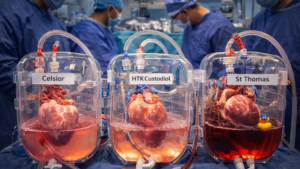The use of mechanical circulatory support devices in cardiovascular practice has risen exponentially over the past decade. These devices are currently used for hemodynamic support in patients with cardiogenic shock, high-risk percutaneous coronary intervention, left ventricular unloading, protection of kidneys, and right ventricular failure. The Impella (Abiomed) percutaneous microaxial flow pump devices are rapidly gaining popularity. However, despite their increasing use, there are limited randomized clinical trials (RCTs) to support the benefits of the therapy and growing concern regarding complication rates. Vascular problems, including bleeding and acute limb ischemia, are associated with the devices, but published reports also highlight risks for cardiac perforations, mitral chordae rupture, and stroke. In this review, we summarize the history, mechanism of action, previously published RCT data, and upcoming RCTs on these devices.







